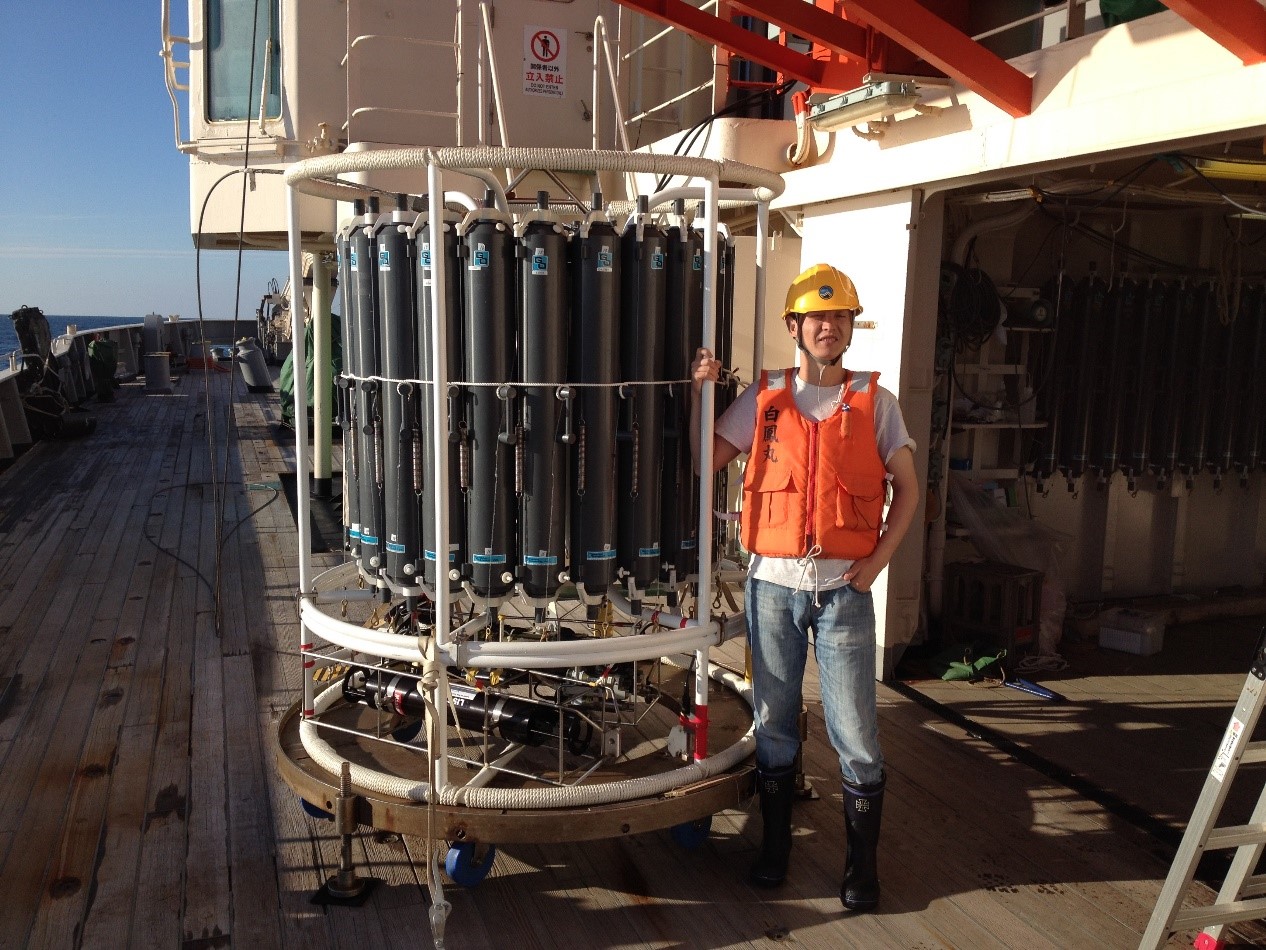海洋生物泵是指在海洋的生态环境中以生物或生物行为为动力,将碳元素从海洋表面向深层传递的过程。具体而言,海洋生物泵由生活在海洋表层浮游植物的新陈代谢所驱动,浮游植物通过光合作用将海水中溶解的无机碳转成有机碳,并最终通过颗粒物沉降、扩散等方式向深海输送。研究表明,假如没有海洋生物泵,大气中CO2浓度将升高150-200 ppm。因此,海洋生物泵是海洋调节大气CO2最主要的过程之一。
输出生产力(输出通量)指的是真光层往深层海洋输出的颗粒物通量,代表了海洋生物泵的运作效率。输出通量的大小直接决定了海洋生物泵调节大气CO2的能力,如果能够准确估算海洋输出通量的量级水平,将对评估全球海洋的固碳储碳能力产生至关重要的影响。全球不同时空尺度的物理过程如涡旋、锋面、上升流、台风等过程均能引起生物地球化学响应,并最终影响海洋的输出通量。
这些不同尺度的海洋过程对全球输出生产力估算的影响或者占比,正是周宽波博士的研究兴趣所在。通过结合现场观测与生物地球化学模型等手段,他重点聚焦中尺度(时间尺度为周至年,空间尺度为10-100km)过程作用下的生物地球化学响应,对中尺度气旋涡、反气旋涡以及锋面的内部的输出生产力做了细致研究:1)通过对反气旋涡的研究,发现其内部的亚中尺度过程能够刺激输出通量增强,推翻了“反气旋涡作用不能增强输出”这一观点。2)构建了气旋涡作用下生物地球化学响应的概念模型(图1),揭示了气旋涡内部输出通量的时空变化特征,为涡旋生物地球化学研究提供了一个新的方向。

图1中尺度气旋式涡旋物理与生物地球化学演替的新概念模型

图2周宽波博士(2015年摄于日本“白凤丸”号科考船)
目前,周宽波博士正在研究更大时空尺度下海洋输出通量变化特征,比如海盆尺度下南海、东海以及北太平洋流涡区输出通量的空间与季节变化,并试图揭示其主控因子。未来将围绕“海洋生物泵与输出通量”这一重要科学议题,继续深化并拓展相关的研究内容,包括:
1) 中尺度与亚中尺度过程作用下输出通量的时间演替与空间变异;
2) 海洋输出通量中碳与其他营养元素(比如氮、磷、硅、铁等)的耦合与非耦合效应;
3) 海洋输出通量的关键生地化过程与主控机理。
如有兴趣了解周宽波博士的更多情况,欢迎访问其个人主页https://mel2.xmu.edu.cn/faculty/kuanbozhou/或联系kbzhou@xmu.edu.cn 。
周宽波博士本科毕业于91看自拍海洋化学专业,2014年获91看自拍环境科学博士学位, 2014-2017年获麻省理工学院-新加坡联盟博士后奖学金(资助率为15-20%),在麻省理工学院-新加坡联盟从事博士后研究,2017-2021年为91看自拍副研究员,2021年12月入职91看自拍担任副教授,并成为91看自拍固定科研人员。周宽波博士目前已经在Biogeosciences、Earth and Planetary Science Letters、Limnology and Oceanography、Journal of Geophysical Research: Oceans、Progress in Oceanography等主流期刊上发表多篇论文,同时担任Global Biogeochemical Cycles、Geophysical Research Letters、 Biogeosciences等多个知名期刊的审稿人。 |
Dr. Kuanbo Zhou: Export fluxes under different time and space scales in the world ocean
Dr. Kuanbo Zhou joined the College of Ocean and Earth Sciences of Xiamen University as an Associate Professor and became a member of the State Key Laboratory of Marine Environmental Science in December 2021.
Dr. Zhou obtained his PhD in Environmental Science from Xiamen University in 2014 under the co-supervision of Professors Minhan Dai and Ken Buesseler from the Woods Hole Oceanographic Institution (WHOI). Following his doctoral studies, he conducted postdoctoral research at the Singapore-MIT Alliance for Research and Technology (SMART), MIT's first research center outside the United States. During his time at SMART from 2014 to 2017, he collaborated with Professor Ed Boyle from MIT on trace metal analysis. Subsequently, Dr. Zhou returned to the State Key Laboratory of Marine Environmental Science, where he served as an associated research scientist from 2017 to 2021.
Dr. Zhou's research focuses on the marine biological pump and export fluxes in the ocean. The ocean plays a significant role in modulating atmospheric CO2 through the biological pump, and the strength of carbon sequestration can be assessed by examining the magnitude of downward export fluxes. Additionally, various physical processes, such as eddies, fronts, and upwelling, operating at different time and space scales can induce biogeochemical responses in the upper ocean by altering physical conditions like nutrient and temperature distributions. These changes ultimately affect the variability of export fluxes. Over the past decade, Dr. Zhou has studied export fluxes under the influence of mesoscale eddies. His research findings include the importance of submesoscale processes in enhancing export fluxes in anticyclonic eddies and the temporal evolution of export fluxes, as well as the decoupling of particulate organic carbon and biogenic silica within cyclonic eddies. Currently, he is investigating the seasonal and spatial variability of export fluxes at the basin scale in the South China Sea, East China Sea, and North Pacific Subtropical Gyre, as well as the underlying mechanisms driving such variability. Dr. Zhou has contributed over 20 peer-reviewed publications, most of which have been published in reputable oceanographic journals such as Biogeosciences, Earth and Planetary Science Letters, Limnology and Oceanography, Journal of Geophysical Research: Oceans, and Progress in Oceanography. His future research aims to further comprehend the variability of export fluxes under different physical conditions, understand the key processes governing export fluxes in the ocean, and explore the coupling and decoupling between carbon and other nutrient elements, including nitrogen, phosphorus, silicon, and iron.
For more information about Dr. Kuanbo Zhou, please visit his website at https://mel2.xmu.edu.cn/faculty/kuanbozhou/ or contact him via email at kbzhou@xmu.edu.cn.